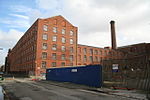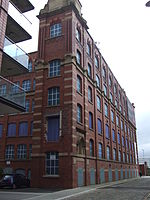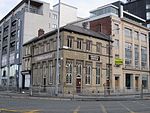Old Mill, Manchester
Cotton industry in EnglandCotton millsFormer textile mills in the United KingdomGrade II* listed buildings in ManchesterGrade II* listed industrial buildings ... and 1 more
Textile mills in Manchester

Old Mill, completed in 1798 as part of Murrays' Mills, is the oldest surviving cotton mill in Manchester, England. Sited on the Rochdale Canal in Ancoats, it was powered by a Boulton and Watt steam engine, and its narrow six-storey brick structure "came to typify the Manchester cotton mill". Old Mill was designated a Grade II* listed building on 20 June 1988.
Excerpt from the Wikipedia article Old Mill, Manchester (License: CC BY-SA 3.0, Authors, Images).Old Mill, Manchester
Bengal Street, Manchester Ancoats
Geographical coordinates (GPS) Address Nearby Places Show on map
Geographical coordinates (GPS)
| Latitude | Longitude |
|---|---|
| N 53.483888888889 ° | E -2.2263888888889 ° |
Address
Murrays' Mills
Bengal Street 50
M4 6LN Manchester, Ancoats
England, United Kingdom
Open on Google Maps










